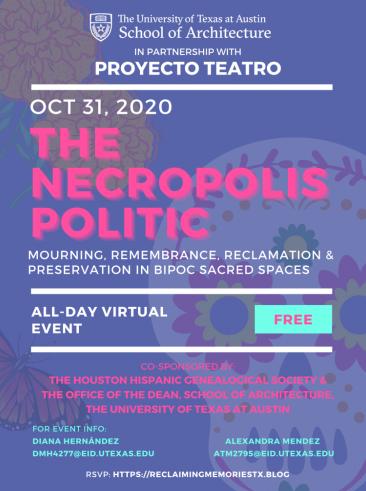The Texas Freedom Colonies Project Supports October 31 Symposium on Black, Brown, & Indigenous Heritage, Cemetery Preservation October 18, 2020
The Texas Freedom Colonies Project aims to develop research and change-making strategies that can be replicated and utilized by marginalized, disappearing communities, particularly historic black communities. As such, we support placemaking and preservation efforts led by communities that have suffered due to racism and colonialism. Historic black settlements founded, generally speaking, between 1865 and around 1920 often have no population left. Often, cemeteries are all that remain. One of the biggest challenges is finding the locations of these places, especially if the only thing left of the community is a cemetery. According to the Texas Historical Commission, on average, 87 cemeteries per county are unaccounted for. That means we know there’s a cemetery, but we don’t know its name, and we don’t know who the keeper is. There are 254 counties in the state of Texas. An average county reports that a third of those 87 cemeteries have no stewards. With every day that passes, the state grows, shifting the infrastructure of lands as a result. The people who might know the location of the cemeteries grow old and pass away. Cemetery location and stewardship is a national problem. Congress has introduced The African American Burial Grounds Network Act, which requires cemeteries to be recorded and funding for preservation be made available. The goals of the Act are consistent with that of The Texas Freedom Colonies Project. For example, both the Act & our project support working with state, local, & non-profit groups, “educating the public and providing technical assistance for community members... to research, survey, identify, record, and preserve burial sites and cemeteries ...” Thanks to a grant from the National Trust for Historic Preservation (NTHP), we can expand our Atlas’ capacity to locate, assess, and educate cemetery stewards in freedom colonies. Only through collaboration with allied causes and groups can we progress toward developing a model, citizen-science based tool for freedom colony descendants. In that spirit, we publicly support the hard-working students behind the “The Necropolis Politic” Symposium. The Symposium is an initiative by a group of graduate students from the University of Texas at Austin School of Architecture’s Historic Preservation and Community and Regional Planning programs, History Department, Latin American Studies Department, and Art History Department. This collaborative effort began as a research project concerned with the San José Cemetery in the Montopolis area of Southeast Austin. This Mexican and Mexican American cemetery holds an incredible story about life in Austin for those identified as “other” in American society due to forces of segregation, racism, and discrimination. Like many BIPOC historic sites in Austin, San José Cemetery is vulnerable to the gentrification overtaking East and Southeast Austin. Such an event also brings attention to recent vandalism at the Evergreen Cemetery The Symposium aims to spotlight work and stories acknowledging and naming loss in Black and Indigenous People of Color (BIPOC) communities and work towards communal justice and remembrance through preservation efforts. The Symposium will highlight scholarly and creative work that speaks to past and present knowledge of rituals for processing grief and loss, research on remembrance against acts of state-sponsored violence, and struggles to reclaim historical The Texas Freedom Colonies Project Preservation. Education. Service. Transformation. Website | Atlas | Facebook | Instagram Contact Us: freedomcoloniesproject@gmail.com Support Our Work Donate!
memory evidenced through our built environment and cultural landscapes. The Symposium will take place virtually, Saturday, October 31st, 202o, from 9 am to 6 pm during the “Fandango de los Muertos� festival.
Register for the Event!
The Texas Freedom Colonies Project Preservation. Education. Service. Transformation. Website | Atlas | Facebook | Instagram Contact Us: freedomcoloniesproject@gmail.com Support Our Work Donate!

